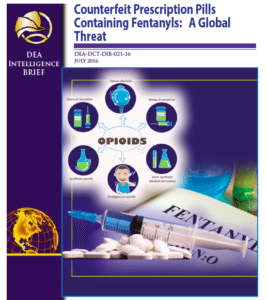DEA Considers Fentanyl-Containing Counterfeit Medications a Global Threat
 As counterfeit pills containing various fentanyl analogues are killing people all over the United States, the DEA takes a measure of this deadly and growing counterfeit drug epidemic.
As counterfeit pills containing various fentanyl analogues are killing people all over the United States, the DEA takes a measure of this deadly and growing counterfeit drug epidemic.
The recent arrival of large amounts of “counterfeit prescription drugs containing fentanyls” is causing an explosive growth in overdose deaths in the United States, according to a new report from the Drug Enforcement Agency (DEA).
The report, titled Counterfeiting Prescription Pills Containing Fentanyls: A Global Threat describes how “hundreds of thousands of counterfeit prescription pills, some containing deadly amounts of fentanyls have been introduced into U.S. drug markets.”
The report examines the breadth and seriousness of the fentanyl-laced counterfeit pills. There were over 700 fentanyl-related deaths reported in the United States between late 2013 and 2014. During this period, the CDC reported that deaths from synthetic opioids (including fentanyl) shot up 79%(3097 to 5,544). A substantial portion of the synthetic opioid deaths appear to be related to the influx of fentanyl.
The report also demonstrates how counterfeit pills containing fentanyl are having deadly consequences. “In March 2016, law enforcement officers in Lorain County, Ohio, seized 500 pills that visually appeared to be oxycodone. The pills were blue and had ‘A 215’ markings, consistent with 30 milligram oxycodone pills. Laboratory analysis indicated that the pills did not contain oxycodone, but were instead the research chemical U-47700. U-47700 is an unscheduled synthetic opioid not studied for human use that has caused at least 17 overdoses and several deaths in the United States.”
Following the DEA’s report, The American College of Emergency Physicians’ Annals of Emergency Medicine published “Fentanyl and a Novel Synthetic Opioid U-47700 Masquerading as Street ‘Norco’ in Central California: A Case Report,” by Patil Armenian, MD, a research physician at the University of California San Francisco on July 26, 2016. The article presents an example case of fentanyl poisoning through unintentional ingestion via counterfeit Norco tablets. While the patient purchases Norco from the street, she intends to purchase acetaminophen-hydrocone tablets for back pain, but in this case received a dose of fentanyl and U-47700, which caused her to black out. She awoke in the resuscitation room in the ER, and immediately alerted emergency physicians to the potential source of her distress. The report states that “She was not intending to harm herself and denied any other illicit drugs or ingesting any medications other than her prescription medications.”
To learn more about the nationwide counterfeit drug fentanyl epidemic, read When Fake Drugs Turn Deadly.